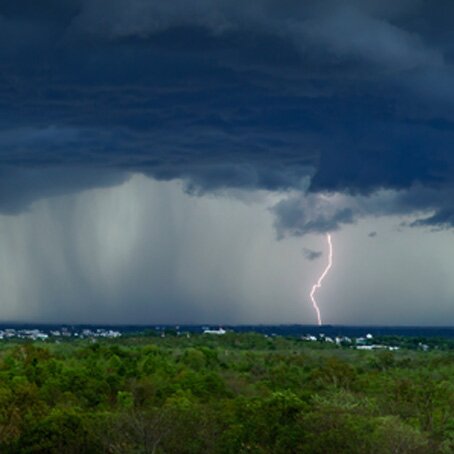Natural Gas Safety During Severe Weather

When it comes to severe weather, most of us are familiar with how it can affect our daily lives. Strong winds, rain and ice can cause damage to our homes and businesses and knock out power for hours, if not days, in some cases. But this isn’t usually the case when we consider natural gas. Below, we’ll talk about why that is and what you need to do in the rare instance severe weather has had an impact on your natural gas.
Natural Gas Cold Weather Safety
Can natural gas pipes freeze?
The chances are slim that the natural gas flowing through the pipes leading to the meter at your home or business will freeze. In its unrefined state, natural gas does often contain water molecules and other chemicals that can freeze—this was an issue in 2021 in Texas where the state experienced unusually cold temperatures that halted the flow of gas before reaching refineries. But by the time it reaches your home or business, it’s been processed and “dried” through several steps that keep this from happening.
But what about the natural gas pipes themselves, you ask? Well, they’re almost never an issue. Unlike the pipes that carry water throughout your home, natural gas lines inside your home won’t get cold enough to be damaged by extreme temperature drops—even if you’re away and haven’t run the heat in a while. And the pipes outside leading to your meter, buried and insulated by soil well below the frost line, aren’t usually an issue, either. They’re typically made from materials meant to withstand the rigors of extreme cold and heat, and your utility company would be responsible for maintaining these pipes anyhow.
Can my natural gas meter freeze?
Natural gas meters are designed to withstand freezing weather. But they can be damaged if snow or ice is allowed to accumulate on them. Be sure there’s no icicle above your meter that can drip water and then later freeze, and never pile snow up against the meter. In cases where light snow fall has built up, it’s OK to gently brush it away. But if your meter is totally iced over or frozen, be sure to call your local utility company and let them handle the issue.
Natural Gas Storm Safety—Tornadoes and Hurricanes
According to the National Oceanic and Atmospheric Administration, tornadoes can happen in all 50 U.S. states, though some experience them more often than others. Texas, Kansas and Oklahoma, for instance, lead the nation in tornadoes, while Georgia (2021) ranks fifth in the nation. Hurricanes, on the other hand, mostly affect states like Georgia and Florida along the Atlantic and Gulf coasts.
What can I do to prepare for a storm?
When a big storm is predicted to hit, people commonly ask “should I turn off my natural gas?.” The answer is no. There’s little you need to do to protect your natural gas supply before a storm. In most cases, it won’t be affected at all. Many utility companies, including Georgia’s largest, Atlanta Gas Light, advise customers against shutting off the valves to their meters beforehand. Leaving it on helps ensure proper pressure is maintained in the pipes, which helps prevent water from entering the lines should flooding take place. Additionally, most gas appliances in homes or businesses have safety valves that automatically cut the supply of gas if the pilot light goes out.
What about after the storm?
If a tornado or hurricane has come through your area and you don’t smell the rotten egg odor of natural gas in your business or home, do a quick check of your furnace, water heater and other appliances that may use natural gas to make sure there’s no damage. You’ll also want to make sure chimneys, flues or any vents are clear of debris or any other obstructions. If flooding has taken place, even if the water has subsided, don’t attempt to operate any gas-powered appliances that may have been under water. Be sure to have a qualified technician inspect or repair any damaged appliances before you attempt to operate them.
If you do smell natural gas—or hear the sound of escaping gas—leave the area immediately, being sure not to use any open flames (like a match) or electrical appliances, including light switches, before you do. Be cautious of potential leaks outside as well. Even though natural gas lines outside are generally protected beneath the ground, uprooted trees or fallen structures can present a potential natural gas leak risk. In all of these cases, don’t worry about trying to find the source of the leak. Get yourself and everyone out of the home, business or area and immediately report the suspected leak to your local utility company (or 911).
 Help
Help Giving Back
Giving Back My Account
My Account Sign Up
Sign Up











